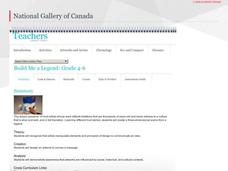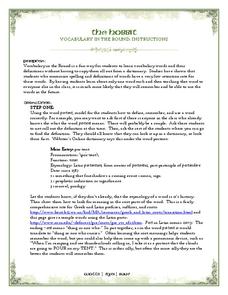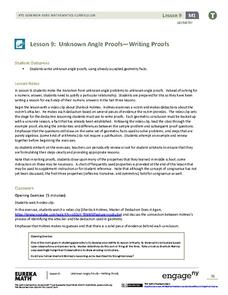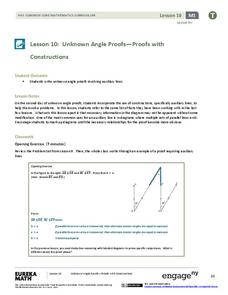Student Handouts
Foreign Affairs
Inform your class about foreign policy during the Reagan administration. The resource includes a reading passage that gives an overview of foreign policy decisions made during the Reagan administration and nine questions for pupils to...
Center for Civic Education
The Power of Nonviolence: Music Can Change the World
Here is a fantastic activity through which class members discover how music has the ability to influence others in a meaningful way. After reviewing selected pieces and modern-day protest songs, learners will research other songs that...
Center for Civic Education
Martin Luther King Jr. and the Power of Words
It is easy to forget the power that written or spoken word can have in effecting change. Using quotations from such inspirational leaders as Maya Angelou, Mahatma Gandhi, and Martin Luther King Jr., encourage your class members to...
National Gallery of Canada
Transformation
Create colorful cool or warm butterflies with simple materials. Class members draw their designs, spray the marker to diffuse the colors, and attach pipe cleaners to form the shape of a butterfly with antennae. Individuals must be able...
National Gallery of Canada
Contemporary Reflections
Combine art and writing in a lesson about legends. After viewing Inuit art, class members examine their own cultural surroundings in order to write and visually represent a legend. Individuals are invited to take the creative reins when...
National Gallery of Canada
Build Me a Legend
Legends are full of imagery and action. Transfer a scene from a legend to a three-dimensional art piece. Class members first view Inuit art and discuss legends. They then build scenes that include action, setting, and characters.
East Lyme Public Schools
To Declare or Not to Declare Independence?
Class members adopt the persona of real figures in American history, Patriots and Loyalists, research these individuals to determine their stance, and then debate the question of whether or not to declare independence from England.
National Gallery of Canada
Reading Sculptures
Consider the elements and principles of design closely while examining works of art. Learners select an image from the provided pieces to write about in relation to the elements and principles of design. They then sketch and sculpt their...
Humanities Texas
Primary Source Worksheet: Frederick Douglass, “Expression of Gratitude for Freedom”
Here is a fantastic primary source analysis activity regarding Frederick Douglass' speech delivered at the unveiling of the Freedmen's Monument in 1876. The follow-up discussion questions and activities highlight Douglass' discussion of...
Beth Kupper-Herr
Taking Notes
When you ask your students to take notes during class, do they really know what you mean? Are they taking the right kind of notes and using their time effectively? Make sure they are by offering this handout, a comprehensive guide and...
Curriculum
Expository Writing
The beauty of the way this expository writing resource is structured is that the units can be presented as a complete writing workshop or sequenced throughout a course of study
North Birmingham Academy
Color Theory
What better way to learn about colors than by coloring? Starting with the primary colors, young artists follow written prompts to shade in various rectangles and a color wheel to show complementary colors, tints and shades, and more.
Curated OER
Pudd'nhead Wilson: Concept Analysis
Learn all about the book Pudd'nhead Wilson with this analysis of the text. You can plan your unit with the useful teacher information provided here and use the project ideas to enrich instruction.
Film Foundation
The Day The Earth Stood Still: Film Language And Elements Of Style
In this, the third in a series of four resources that use Robert Wise's 1951 version of The Day The Earth Stood Still as the core text, young film makers examine the language of film including shot composition, camera angle, lighting,...
Association of American Geographers
Project GeoSTART
Investigate the fascinating, yet terrifying phenomenon of hurricanes from the safety of your classroom using this earth science unit. Focusing on developing young scientists' spacial thinking skills, these lessons engage learners in...
British Columbia Education
Physical Disabilities/Chronic Health Impairments Instructional Support Planning Process
Perfect for review at an IEP meeting, this template walks the user through assessing and assigning modifications for a learner's physical disability. Strengths and needs are determined across five domains: physical functioning,...
Novelinks
The Hobbit: Vocabulary in the Round
Blundering, audacious, obscurest. Class members develop strategies for teaching each other vocabulary words drawn from The Hobbit.
Minnesota Literacy Council
Scientific Method
Here is a resource with a descriptive approach to explaining the scientific method. It's simple, but effective for both introduction and reinforcement of this concept.
Council for the Curriculum, Examinations and Assessment
Managing Change
"I don't want change; I want swiss!" As Willy Loman bemoans in Arthur Miller's Death of A Salesman, accepting change can be a real challenge. The aim of this session is to encourage class members to see the naturalness and inevitability...
Curated OER
Parts of a Friendly Letter
The art of writing a letter has not been lost to email and texting! Teach kids how to format a friendly letter with a presentation about the parts of a letter, as well as prompting them to write a letter about their favorite holiday.
EngageNY
Unknown Angle Proofs—Writing Proofs
What do Sherlock Holmes and geometry have in common? Why, it is a matter of deductive reasoning as the class learns how to justify each step of a problem. Pupils then present a known fact to ensure that their decision is correct.
EngageNY
Unknown Angle Proofs—Proofs with Constructions
Provide your emerging mathematicians with the tools to learn as they incorporate auxiliary lines to solve unknown angle proofs in this continuing segment. They decipher information from a diagram to uncover the missing pieces and...
Ohio Literacy Resource Center
Arguing with Aristotle Ethos, Pathos, Logos
Introduce your classes to the Art of Rhetoric with a lesson that focuses on Aristotle's persuasive appeals and how they have been used, both ethically and unethically, to influence opinion.
Scholastic
Persausive Writing
A unit on persuasive writing guides elementary learners through the writing process. The first part examines the elements of persuasive writing, including expressing an opinion, connecting ideas, using supporting facts, and writing...
Other popular searches
- Transition Words
- Transition Phrases
- Transition Words Activities
- Transition Words and Phrases
- Transitional Words
- Transition Words List
- Peaceful Transition of Power
- Writing Transitions
- Transition Words in Writing
- Transitions in Writing
- Using Transition Words
- Demographic Transition

























